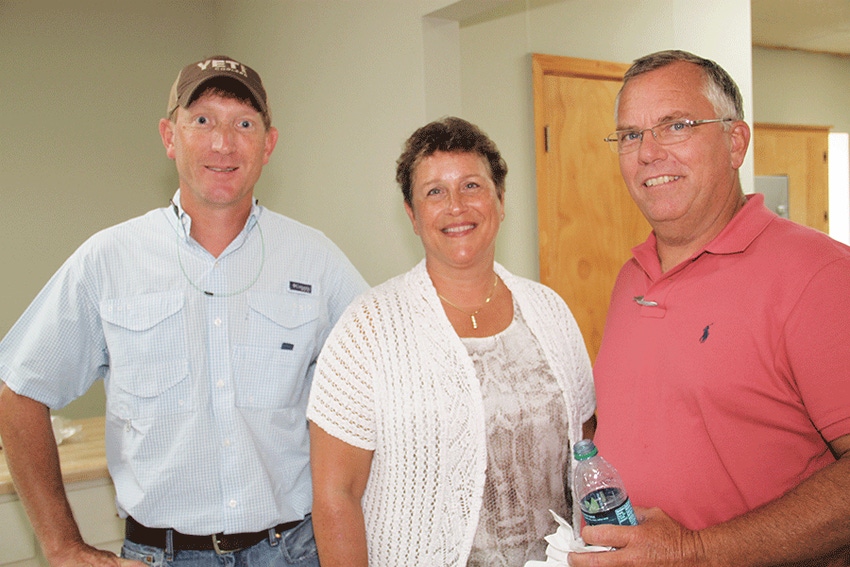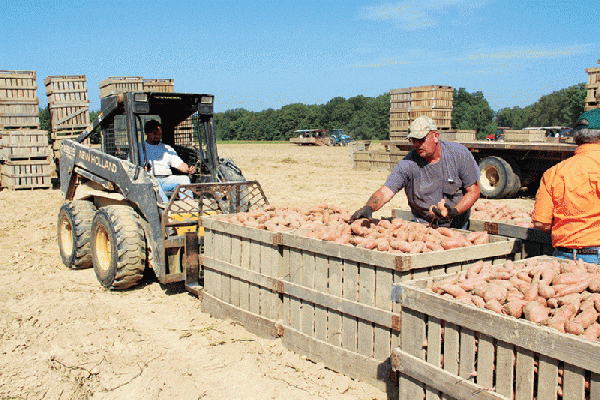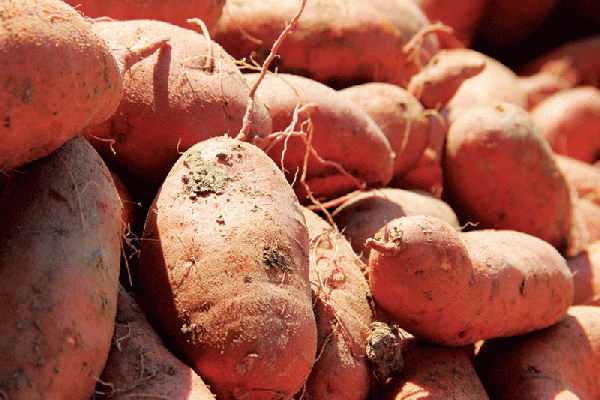
Labor issues remain a challenge for U.S. agriculture, and particularly for sectors that are labor-intensive such as fruits and vegetables, says Kay Rentzel.
“We know the labor regulation system is broken; Congress knows it’s broken,” she said at the Mississippi Farm Bureau Federation’s annual sweet potato commodity meeting. “This is especially critical to farmers who rely on workers to help at key times such as planting and harvest.”
Rentzel, who recently joined the U.S. Sweet Potato Council as its executive director, has more than 30 years of industry experience, having worked for the National Peach Council, the Pennsylvania Apple Marketing Board, and the National Apple Month Program for the U.S. Apple Association. Her responsibilities for the sweet potato organization include working with Congress on policy and regulations, and national and state-level sweet potato industry groups to support strategy development.
Stay current on what’s happening in Mid-South agriculture: Subscribe to Delta Farm Press Daily.
“We spend a lot of time with members of Congress and key staff on labor issues,” she said during her visit with Mississippi growers. “We continue to drive our message home, that we need the labor situation fixed.
“We don’t need to have comprehensive debate on labor issues and immigration issues at the same time — all we’re asking for now is for them to give us a viable guest worker program so agriculture can have a stable, adequate, and predictable supply of labor. Whether it’s H-2A or something new, we need for this to be resolved. But, if they want to stick with the H-2A program, they need to address the adverse effect wage rate — it puts you in an unfair situation and affects your bottom line.”
Adverse Effect Wage Rates for the employment of temporary or seasonal non-immigrant (H-2A) foreign workers to perform agricultural labor or services, are the minimum wage rates the U.S. Department has determined must be offered and paid by employers to H-2A workers and workers in corresponding employment for a particular occupation and area so that the wages of similarly employed U.S. workers will not be adversely affected.
“We try to remind these key congressional people on a regular basis of our needs and issues related to labor,” Rentzel says. “When sweet potatoes are ready to be planted or harvested, labor needs to be available.
Educating members of Congress about agriculture
“One of the biggest pushbacks I get in discussing agricultural issues is from some of the urban members of Congress, who tell me ‘I don’t have any agriculture in my district, so why should I listen to you?’ And I tell them, ‘Yes, but you eat don’t you?’ We’re trying to educate them on the importance of agriculture at the same time we’re working to influence policy.”

“When sweet potatoes are ready to be planted or harvested, labor needs to be available," says Kay Rentzel, U.S. Sweet Potato Council.
“When sweet potatoes are ready to be planted or harvested, labor needs to be available," says Kay Rentzel, U.S. Sweet Potato Council.E-Verify, the government’s Internet-based system that allows businesses to determine the eligibility of employees to work in the U.S., is not the complete solution, Rentzel says.
"It’s one of the tools that can be used once we get an effective guest worker program for agriculture. But agriculture opposes mandatory E-Verify without a solution that addresses our current agricultural work force and creates a new guest worker program to meet future needs. An enforcement-only, or enforcement without reforming our broader immigration system approach, will have a devastating impact on rural economies across America.”
Tax policy is also an ongoing issue of concern for agriculture, Rentzel says, particularly Section 179 dealing with depreciation, and the so-called “death tax.”
Section 179 allowed the immediate expensing of capital purchases — “an incentive for farmers to invest in their businesses” — and reduced the recordkeeping burden associated with the depreciation. It gave agricultural producers a way to maximize business purchases in years when they had a positive tax flow, and it facilitated their planning.
“We’re asking for renewal of these expired tax policies to allow depreciation of farm purchases as in the past,” Rentzel says. “Those expired policies are now back with the Senate Finance Committee for consideration. The U.S. Sweet Potato Council, along with nearly 90 other national commodity organizations, has signed onto letters asking for reinstatement of policies to allow farmers to take depreciation on a timely basis and not have to spread it out over a long period of time.”
Important upcoming events: Delta Farm Press Calendar of Events
While nothing has been resolved on the estate tax issue, Rentzel says, “We continue to encourage members of Congress to repeal the death tax, so you can pass your farming operations to future generations without penalty.”
Water rule 'overreaching' by EPA and Corps
The Waters of the U.S. rule proposed by the Environmental Protection Agency and the Corps of Engineers is “an example of government overreach,” she says. “With respect to the rule in its present form, we feel these two agencies have significantly exceeded their jurisdictional authority under the Clean Water Act.

Research is important for the progress of the sweet potato industry, says Kay Rentzel.
Research is important for the progress of the sweet potato industry, says Kay Rentzel.“As a personal example, I don’t grow a single crop, but this rule could impact me as a homeowner because of the way the water runs on my property when it rains. I don’t think the average citizen really understands how far-reaching this is.”
Research is important for the progress of the sweet potato industry and other agriculture sectors, Rentzel says. “The cost of doing research today is astronomical. We very much support continued federal funding for key agricultural research projects — whether fully funded or in-kind support. Research helps farmers to overcome some of the hurdles that limit their production or increase costs.”
Priority areas supported by the sweet potato industry, she says, include improving plant quality, increasing productivity, packing operations and processing facilities, and plant health.
“Our council works with the USDA and related research entities to support federal funding and industry collaboration in the priority areas of genetics, genomics, and plant breeding, automation, sensor technology and diagnostics, and improving plant health.
“Many grants and funding are mandated in the new farm bill — the money is there; we just need to figure out how to get it back to our commodity. It really is exciting to have that commitment in this legislation, and we’re going to work to build collaborative programs, in addition to those already established, to get more industry involvement for needed research.”
Proactive stance on food safety
Food safety is “an issue that isn’t going away,” Rentzel says. “What we’re asking is that any food safety policy should be risk based, that it should be relevant to specific science, and that it should be commodity specific.

Purchases of U.S. sweet potatoes for government food programs, primarily school lunch programs, got “a nice bump†up for 2015.
Purchases of U.S. sweet potatoes for government food programs, primarily school lunch programs, got “a nice bump†up for 2015.“The council is going to be proactive in this. We’re working with a Washington agency to develop a crisis plan, so we’ll be ready if a food safety incident affects our industry. One such incident can touch everybody, and we want to have a plan in place so we can respond quickly and effectively if an issue occurs.”
Purchases of U.S. sweet potatoes for government food programs, primarily school lunch programs, got “a nice bump” up for 2015, Rentzel says.
For the fiscal year Oct. 1, 2014, to Sept. 30, 2015, purchases are projected at 1,846,800 pounds, compared to 1,034,664 pounds in 2014.
In 2014, purchases of canned sweet potatoes totaled $650,536; in 2015, that is projected at $1,168,792. The numbers are down for frozen sweet potatoes, $877,879 in 2014 versus $105,521 for 2015, and 1,386,000 pounds in 2014, compared to 158,400 pounds in 2015. But Rentzel says, “These purchases may increase before the end of the fiscal year.”
Purchases of fresh sweet potatoes in 2014 totaled 11,020,000 pounds, valued at $1,996,122. In 2015, fresh poundage is estimated at 11,873,473 pounds, with a value of $3,222,764, reflecting better market prices.
“We recognize that school lunch programs is an area that has opportunity for expansion,” Rentzel says. “If we can get more sweet potatoes in those programs, so children can have exposure to our product, it will provide an opportunity to drive future consumption.”
Contact with Congress is important

“Don’t underestimate the importance of reaching out to your congressional representatives," says Kay Rentzel.
“Don’t underestimate the importance of reaching out to your congressional representatives," says Kay Rentzel.She reminded growers of the importance of contacting members of their congressional delegation and staff about issues of concern to their industry.
“Please don’t underestimate your voice — the importance of reaching out to your congressional representatives,” she says. “Contact their local offices. You don’t have to make a trip to Washington; a lot of their work gets done in local offices, so telephone or e-mail them.
“When issues are on the table that affect you, let them know how you feel, how it will impact your business. Invite them out to your farm to see what you’re up against in getting the labor you need at planting or harvest, or how the Waters of the U.S. rule will affect your operation.”
Don’t use snail mail, she advises, because it has to be screened, which will result in delays.
About the Author(s)
You May Also Like




